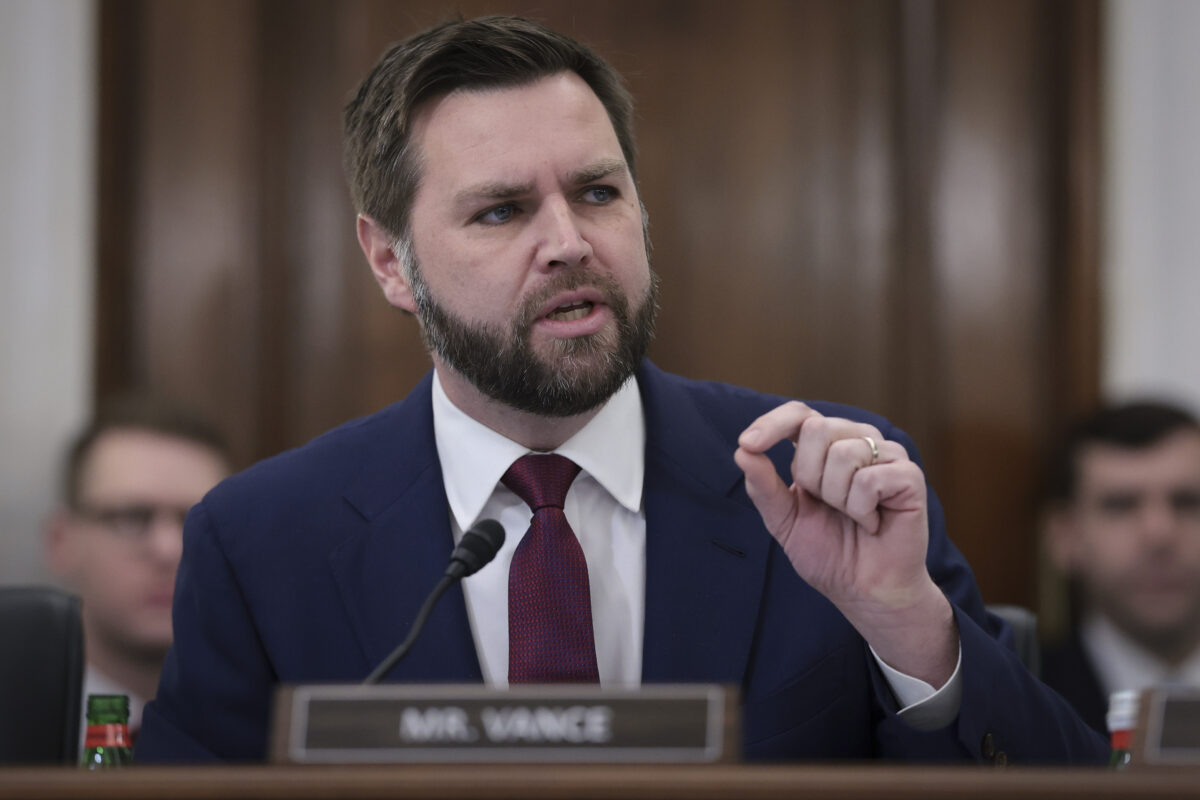U.S. invasion of Iraq ultimately bolstered Iran, Vance argues
The first day of the Heritage Foundation conference put the GOP’s growing isolationist and protectionist wing on full display, with a focus on countering China above all else

Photo by Win McNamee/Getty Images
Sen. J.D. Vance (R-OH) delivers remarks during a hearing held by the Senate Commerce, Science, and Transportation Committee on March 22, 2023 in Washington, DC.
Sen. J.D. Vance (R-OH) argued Thursday that the U.S. invasion of Iraq served primarily to bolster Iran and increase the threat to Israel, in a speech to the Heritage Foundation’s 50th anniversary conference.
Vance is a prominent avatar of the GOP’s growing national conservative or New Right wing, which adopts a more isolationist and protectionist approach to most foreign policy issues than many in the GOP. The Heritage Foundation itself, once a bastion of Republican hawkishness and free-market ideology, is increasingly aligning with this wing of the conservative movement — a fact highlighted throughout the first day of the influential think tank’s two-day conference in the D.C. area.
Vance called the Iraq war “perhaps the most unforced and catastrophic error in the history of this country,” arguing that its result was “we spent trillions of dollars, we killed thousands of Americans and more Iraqis, we eradicated the oldest Christian population in the world, all in the service of increasing the power of Iran and putting our ally Israel under greater threat.”
Vance, who enlisted out of high school to serve in the Iraq war, lamented that many of the figures who supported the war remain influential, and framed the U.S.’ support for Ukraine as a potential repetition of the mistakes made in Iraq. Vance does not support continued U.S. aid to Ukraine as it fends off a Russian invasion.
While the freshman Ohio senator said that he “admires the Ukranians” and referred to Russia as a “very terrible enemy,” he described Ukraine as having “the most corrupt leadership and corrupt government in Europe, and maybe the most corrupt leadership anywhere in the world.”
Vance, in line with Heritage’s own platform, argued that U.S. aid going to Ukraine would be better spent at home or on reinforcing Taiwan against a potential Chinese invasion and that the U.S. lacks the resources to reinforce both Ukraine and Taiwan at the same time.
“The thing that we need to prevent more than anything is a Chinese invasion of Taiwan; it would be catastrophic for this country, it would decimate our entire economy… it would [pull] this country into a great depression,” Vance argued.
Vance and Heritage’s focus on China as the U.S.’ top foreign policy priority — to the exclusion of Ukraine — echoed throughout several other speeches during the conference’s first day.
“We have got to focus rigorously on countering China, our biggest threat, and do less elsewhere around the world,” Sen. Josh Hawley (R-MO), another prominent national conservative, said. “We cannot be the world’s police, we should not try to be. We do not have to be a global hegemon, but we do have to defend American interests and American security.”
Hawley framed China’s rise as the result of decades of failed U.S. foreign policy, including by post-Cold War conservatives, in embracing “what you might call a politics of New World Order” focused on an interconnected global economy. The key mistake, in Hawley’s telling, was admitting China into the World Trade Organization and granting it Most Favored Nation status.
“This had some appeal on the right because, after all, conservatives had, for years, rightly defended the free market against Soviet-style central finance,” he said. “But the kind of unified, globalized economy… is very different than the free-market economies of nation-states.”
Hawley blamed this policy vision for the U.S.’ “permanent presence in the Middle East” and “forever a giant footprint on the European continent” and “decades in constant conflict, arguing that “an end to liberal imperialism abroad” is necessary to preserve the United States.
Hawley’s critiques of traditional Republican free-market policies — a stark shift away from the Republican Party and Heritage Foundation of decades past — were echoed by speakers on a China-focused panel that closed out the afternoon.
Rep. Chip Roy (R-TX) argued that some Republicans don’t support the steps he said are necessary to combat China in the technology space because “they’re so beholden to market thinking that they go, ‘We can’t interfere with Google or Apple or whatever.’”
Ambassador Robert Lighthizer, who served as the Trump administration’s trade representative, struck a similar tone, arguing that countering China needs to take precedence over traditional GOP free-market priorities.
“When you find an actual conservative Republican who thinks that market principles are more important than American families and communities — I’d love to have a meeting with the person,” Lighthizer said. “The market is what got us to the point that we have this trillion-dollar [trade] deficit.”
Roy also called for a new Monroe Doctrine approach to “own Latin America ourselves” and push out growing Chinese influence in the Western Hemisphere.









